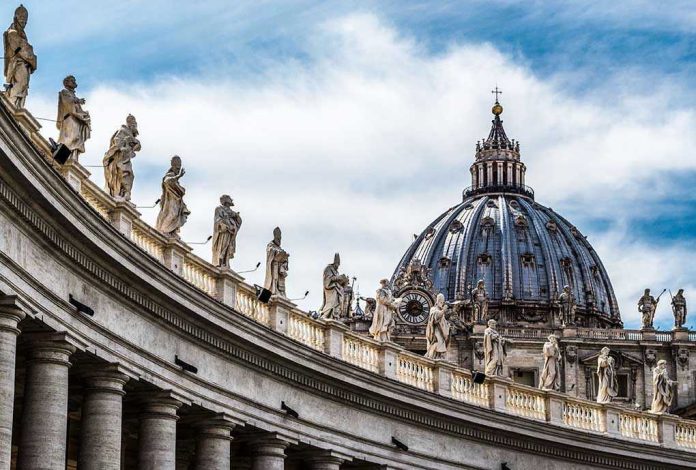
A former Vatican auditor’s explosive allegation of a “skeleton key for money laundering” threatens to expose systemic financial corruption at the heart of the Catholic Church’s treasury operations.
Story Highlights
- Former Auditor General Libero Milone alleges Vatican’s APSA possessed tools to alter transaction names and account numbers after processing
- Technical experts dismiss claims as “impossible” within SWIFT banking systems, while Vatican categorically denies allegations
- Milone claims he reported concerns to Pope Francis and top officials but was forced to resign in 2017 amid “spying” accusations
- Cardinal George Pell allegedly warned in 2016 that proposed SWIFT control changes were “potentially illegal”
Whistleblower’s Explosive Claims Challenge Vatican Financial Controls
Libero Milone, the Vatican’s former Auditor General from 2015 to 2017, has emerged with devastating allegations against the Administration of the Patrimony of the Apostolic See (APSA), the Vatican’s treasury and payroll office. Milone claims APSA possessed or used a sophisticated “tool” enabling post-transaction alterations to names and account numbers on already-processed financial transfers. If true, such capabilities would represent what Milone describes as a “skeleton key for money laundering,” potentially undermining core anti-money laundering controls that protect the global banking system from financial crimes.
The former Deloitte executive maintains he possesses documentary evidence proving these extraordinary capabilities but has not publicly released the material, citing concerns about potential blackmail accusations. Milone alleges he reported these serious concerns directly to Pope Francis and Secretary of State Cardinal Pietro Parolin, yet claims no meaningful action was taken to address the systemic vulnerabilities he identified during his tenure as the Vatican’s first Auditor General.
Technical Experts and Vatican Officials Reject Allegations
Financial technology experts interviewed by Politico have categorically dismissed Milone’s technical claims as fundamentally impossible within established SWIFT banking protocols. These experts emphasize that core messaging standards and settlement processes are specifically designed to prevent silent post-facto edits that could mask transaction counterparties or alter critical payment metadata. Such alterations would require unprecedented collusion across multiple banking systems and counterparties, leaving detectable audit trails that would expose any attempts at manipulation.
Vatican spokesperson Matteo Bruni has firmly rejected all allegations, asserting that APSA has undergone comprehensive internal and external audits since 2020, including reviews by PricewaterhouseCoopers, with no problems identified. The Vatican’s categorical denial extends to any suggestion that such transaction-manipulation tools existed or were deployed within their financial operations, positioning these claims as technically unfounded attacks on their reformed financial governance structure.
Reform Efforts Met With Internal Resistance and Retaliation
Milone’s 2017 forced resignation came amid accusations of “spying” leveled by Archbishop Angelo Becciu, a senior Vatican official who has featured prominently in previous financial controversies. The auditor’s removal occurred during his aggressive anti-corruption investigations, creating a pattern of institutional resistance to oversight that undermines confidence in Vatican financial reforms. This power dynamic reflects longstanding tension between reform-minded oversight officials and entrenched bureaucratic interests within the Curia.
Cardinal George Pell, who led significant financial reforms before his death, allegedly raised concerns in 2016 about requests to alter SWIFT controls, describing such changes as “potentially illegal” in correspondence cited by reports. APSA reportedly ceased serving private clients in 2015 to avoid enhanced oversight requirements, a decision critics interpret as evidence of opacity concerns rather than genuine reform commitment. These developments suggest systematic efforts to limit external scrutiny while maintaining questionable financial practices.
Broader Implications for Vatican Credibility and Global Banking
These allegations emerge within decades of Vatican financial scandals, including the notorious IOR (Vatican Bank) controversies that damaged the Holy See’s reputation and necessitated extensive reforms under Pope Francis. If substantiated, Milone’s claims would trigger major compliance ramifications for correspondent banks processing Vatican-related payments, potentially leading to widespread de-risking that could isolate Vatican financial operations from global banking networks. The controversy threatens to undermine years of reform efforts designed to align Vatican financial practices with international anti-money laundering standards.
Sources:
Vatican faces new financial intrigue
Vatican faces allegations of secret tool to alter
Vatican financial obscure transactions claims bank transfers money laundering
Politico reported Vatican’s accusation money laundering














